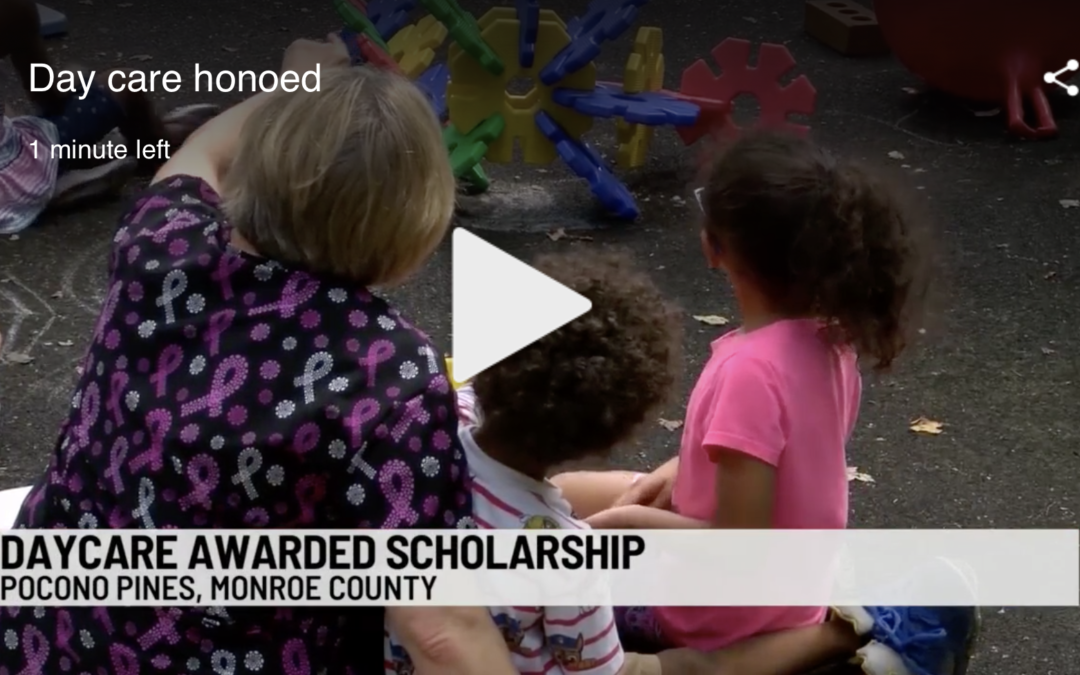
Morning Call: Letter to the Editor: Teacher: Why Quality Pre-k Programs are Important
August 30, 2019
When my students walk in on that first day of kindergarten, children who didn’t attend high-quality pre-K are usually not as prepared for learning and often struggle to keep up with the children who did. They are more hesitant to make friends, less confident to ask or answer a question, aren’t prepared for the flow of the school day, and they aren’t as ready to learn.
Teachers statewide, including me, thank our lawmakers for their votes in June to approve $30 million more for pre-K in the 2019-20 state budget. However, more needs to be done.
We need to continue seeing the support of our lawmakers until all children in Pennsylvania have access to a high-quality pre-K program. It is our best chance to prepare every child for success in kindergarten and in life.
Amy Bell
Read the Letter to the Editor here.

WBRE: Monroe County Daycare and Preschool Honored
August 23, 2019 by Jayne Ann Bugda
POCONO PINES, MONROE COUNTY (WBRE/WYOU-TV) It’s back to school time and one pre-school in our area is being recognized for its success.
Wee Wons Daycare and Preschool In Pocono Pines is celebrating its 31st anniversary. State Senator Mario Scavello and State Representative Jack Rader presented the school with a certificate this afternoon.
The early learning center can provide care for 125 students and has the highest rating by a state grading system.
Thanks to Vigon International A Pre-K Scholarship was also awarded by the Pocono Mountains United Way for $10,000. The funds will help low-income students attend the school. Over the years the fragrance company has donated about $80, 000 to various early education programs.
“We recruit from the community. Our team shops in the community go to church in the community so as the leader of this team I feel an obligation to be able to give back.” Said Stephen Somers, President Vigon International
“Our kids come first. It’s all about the kids, they’re our future so we want this for them so we can give them so our future is what it should be. We give them what we can to help them get to that point” said Cheryl Traylor, Director Wee Wons
After the presentation, Senator Scavello put on his “thinking cap” and read to the students.
Watch the video coverage here.

York Dispatch: OpEd: Quality pre-K prepares kids for school
August 1, 2019 by Ruthie Mohney, Northeastern School District
As a kindergarten teacher of nearly 17 years, I am often asked if I notice a difference between kids who have attended prekindergarten and those who have not. My answer is always the same: YES, YES, and YES!
As a new school year begins, I know I will see it again. Students coming into kindergarten from quality pre-K have an advantage over their peers who didn’t get the same opportunities.
That’s why I’m among the 96 percent of Pennsylvania kindergarten teachers who confirm what research has historically indicated — that children who attend high-quality, publicly funded pre-K enter kindergarten ready to succeed. We said so in a statewide survey from the Pre-K for PA campaign and the Pennsylvania State Education Association. Remarkably, 98 percent of my colleagues agree that high-quality, publicly funded pre-K is an important tool in preparing at-risk children for kindergarten.
Children who didn’t get high-quality pre-K are usually not as prepared for learning and less confident when they walk in on that first day of kindergarten. They are more hesitant to make friends, less confident to ask or answer a question, are less willing to share, and aren’t as ready to learn. I must spend more of my time teaching them academic fundamentals, such as literacy and numeracy, as well as classroom routines.
Research shows the varied benefits of high-quality, publicly funded pre-K:
- Physical well-being: Regular physical activity is essential to the developing brain’s ability to gather, process, and understand information.
- Social-emotional readiness: Teachers trained in developmentally appropriate practices guide young children in building peer relationships. When children get along and know how to control their impulses, every student in the classroom enjoys uninterrupted learning.
- Brain development: In the first few years of life, the brain builds 1 million new neural connections every minute. Skilled caregivers deliver positive interactions and experiences that hardwire these connections and create the foundation for a lifetime of learning.
- Early literacy development: No matter their family income, children who attend high-quality, publicly funded pre-K meet expected reading benchmarks by the time they finish third grade.
Fortunately, Pennsylvania lawmakers have long supported investments in early learning. Kindergarten teachers statewide, including me, thank them for their votes in June to approve $30 million more for pre-K in the 2019-20 state budget.
However, more needs to be done. In York County, 77 percent of 3- and 4-year-olds eligible for publicly funded pre-K don’t have access.
Children can’t wait. Every year of delay leaves another cohort of children behind their peers in academics and social skills. Continued support from our state policymakers in Harrisburg is our best chance to prepare every child for success in kindergarten and in life. I can’t wait for the day when people ask if every child in my classroom is thriving because they’ve all had high-quality pre-K, and I can say YES!
— Ruthie Mohney is a kindergarten teacher in Northeastern School District.
See the oped here.

Pre-K for PA Lauds Continued Investment in High-Quality Pre-K
Harrisburg, PA (June 27, 2019)–In the final FY 2019-20 budget agreement, the Commonwealth of Pennsylvania continued to make progress on behalf of its youngest learners by prioritizing expanded access to high-quality pre-k.
The principal partners of Pre-K for PA issued the following statement regarding the increased investment:
“The Pre-K for PA campaign, representing tens of thousands of Pennsylvania families, appreciate that lawmakers in Harrisburg understand the irrefutable value of investing in high-quality pre-k. We applaud Governor Wolf and the legislature for maintaining the political will to continue to invest in greater access to high-quality pre-k for yet another year.
“Research shows that high-quality, publicly funded pre-k benefits children’s cognitive, social, and emotional development. From birth to age five is the most rapid period of brain development in a child’s life and the nurturing interactions that children experience in high-quality early learning programs are key to their future success. This is why in every corner of the commonwealth, across all demographics, an overwhelming majority of Pennsylvanians support investing additional state dollars to expand access to high quality pre-k.
“We all know that there is more work to be done, but today represents another milestone as we chip away at the number of children who are missing out on this once-in-a-lifetime learning opportunity.”
The goal of the non-partisan Pre-K for PA campaign is that by 2022 every at-risk child will have access to a high-quality pre-kindergarten program and that middle-income families will more easily afford these services for their children. High-quality pre-k is delivered in Pennsylvania in a variety of settings: school districts, Head Start centers, licensed private academic nursery schools, home-based care, and roughly half in STAR-3 and -4 Child Care centers.
Pre-K for PA is an issue campaign supported by individuals and organizations across Pennsylvania who believe that investing in our children is the right choice and an urgent necessity. Its vision is that every 3- and 4-year-old in Pennsylvania will have access to high-quality pre-k. For more information visit www.prekforpa.org.

Morning Call: Your View by retired Allentown police chief: ‘Spend more on potential, less on penitentiaries’
June 22, 2019 by Roger MacLean
If you happen to be looking for high school dropouts, check out Pennsylvania’s state prisons. Four of the 10 inmates sent there in 2018 did not have high school diplomas, according to Michele Hiester, the chief of research and evaluation for the state Department of Corrections.
And if you want to know about young people entangled in the criminal justice system, you’ll find that 13 out of every 100 arrests in Pennsylvania involves someone aged 17 to 24.
Those who commit property and violent crimes leave behind a trail of victims whose sense of personal security has been shattered forever.
Pennsylvania’s law enforcement professionals are tough on criminals because it is their job and their mission, but we know that safer communities start with diverting youth from lives of crime in the first place. We can fight crime by assuring that each Pennsylvania child earns a high school diploma and grows up to lead a productive, law-abiding life.
This path demands a continuum of public investment in childhood, building a foundation of success from birth through graduation. As Pennsylvania’s policymakers set priorities for next year’s state budget, they should seek to:
∗ Strengthen families through voluntary home visiting programs. In 2017 there were 4,836 substantiated reports of child abuse in Pennsylvania, according to the Pennsylvania Department of Human Services. Children who are victims of abuse are more likely to become involved in crime later, most experts agree.
Home visiting is a proven and powerful prevention tool. Trained home visitors coach parents in healthy child development and how to manage the stress that often triggers abuse. Research shows that children are healthier and families are more self-sufficient.
∗ Grow access to early education. From birth to age 5, the brain builds 1 million neural connections a second. These connections are meant to encourage learning, impulse control and physical health, but first, they must be “hard-wired” in place. That is the role of high-quality pre-K and child care, especially when it helps at-risk children overcome the long-term consequences of hardship and trauma at home.
∗ Adequate and equitable K-12 education funding. High school dropouts are more likely to end up in prison. The seeds of dropping out are planted in early school years, when students fall so far behind academically that they never catch up. Many attend severely financially distressed schools, where classroom amenities are skimpy and career-exploration opportunities are scarce.
It’s time to spend more on potential, and less on penitentiaries. Our children will be better educated and our communities will be safer.
Roger J. MacLean is president of the Allentown City Council and a retired Allentown police chief.
View the article here.






